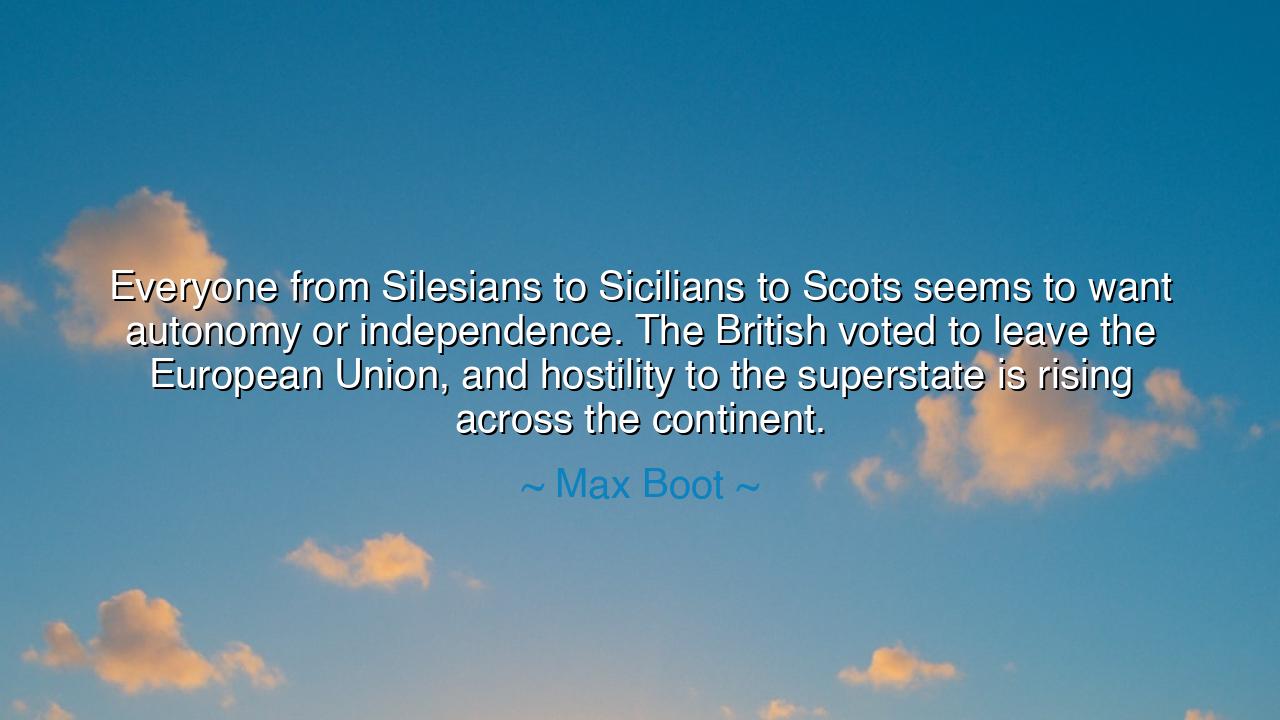
Everyone from Silesians to Sicilians to Scots seems to want
Everyone from Silesians to Sicilians to Scots seems to want autonomy or independence. The British voted to leave the European Union, and hostility to the superstate is rising across the continent.






The historian and commentator Max Boot, observing the shifting tides of nations and the restless spirit of our age, once wrote: “Everyone from Silesians to Sicilians to Scots seems to want autonomy or independence. The British voted to leave the European Union, and hostility to the superstate is rising across the continent.” These words, though spoken of the modern world, carry the tone of something ancient — the eternal rhythm of human nature itself. For across the ages, people have yearned for self-determination, for the right to govern themselves, to shape their destiny not as subjects of distant rulers, but as masters of their own fate. In Boot’s reflection, we hear the echo of that timeless desire — the cry of nations and peoples who seek freedom, even at the cost of unity.
At its heart, Boot’s observation captures the conflict between two great forces that have always wrestled for dominion over the human story: the desire for independence and the need for belonging. These two are like twin rivers that flow beside one another, sometimes joining, sometimes clashing. The first springs from pride — the will to be free, to chart one’s own course, to live without bowing to others. The second flows from wisdom — the understanding that strength often lies in union, that peace and prosperity are easier guarded together than apart. The tension between these two forces is the pulse of history, and in the age Boot describes — an age of fragmentation and rising nationalism — the current once again turns toward independence.
The origin of these sentiments can be traced not only to the 21st century but to the dawn of civilization itself. Every empire that has risen — Rome, Persia, Britain, the Soviet Union — has one day faced the rebellion of its provinces. The Silesians, nestled between great powers, dream of reclaiming their cultural identity; the Sicilians, bound to Italy, remember their distinct heritage; the Scots, bound by centuries of union, feel the stirrings of ancient sovereignty. And beyond them, the British people, who once ruled over half the earth, turned inward in their own referendum, seeking autonomy from the European Union. In each case, the call for independence is not only political — it is spiritual. It is the desire of a people to say: “We are ourselves. We belong to no one.”
Yet Boot, ever the student of history, warns us that this yearning carries both glory and peril. For the same flame that burns for freedom can, if left unchecked, consume the bonds of cooperation that sustain peace. The European Union, born from the ashes of two world wars, was conceived as a fortress against the madness of division — a pact of unity among nations that once destroyed one another. But as Boot notes, the tide of hostility to the superstate has risen once more. The dream of collective identity is challenged by the old, fierce call of nationalism. The age of empires may have ended, but the age of separation begins anew.
History offers many mirrors to this moment. In the 4th century B.C., when the Greek city-states grew weary of unity under Macedonian rule, they longed for independence — yet in their disunity, they fell to Rome. Centuries later, the Roman Empire itself, weakened by internal division, fractured into pieces that could no longer defend one another. Again and again, the lesson repeats: unity demands sacrifice, but disunity demands a heavier price. And still, the human heart cannot resist the call of freedom, even when it leads to hardship.
Boot’s reflection, therefore, is not merely an observation of politics, but a meditation on human nature. It reveals that the thirst for autonomy is as essential to the human soul as breath — and yet, like fire, it must be tempered, lest it destroy the very world it seeks to illuminate. The challenge of every age is to find balance: to preserve independence without forsaking cooperation, to honor identity without breeding division, to build communities that respect the sovereignty of each while serving the good of all.
Let this, then, be the lesson passed down: freedom and unity must be held in harmony, like two wings of the same bird. A people who cling to unity alone will suffocate in conformity, but a people who worship independence without wisdom will shatter into chaos. True strength lies not in isolation, but in sovereign cooperation — in the will to stand free while walking together.
Thus, as Max Boot observed, the cry for autonomy that rises from Silesia to Sicily, from Scotland to London, is not new — it is the eternal heartbeat of mankind. It reminds us that the spirit of independence can never be extinguished, but it also warns that without balance, the desire for freedom can unravel the fabric of civilization itself. May the nations of today remember what the ancients once knew: that the path to lasting greatness lies not in conquest or division, but in the wise blending of liberty and unity — the two pillars upon which all enduring peace must stand.






AAdministratorAdministrator
Welcome, honored guests. Please leave a comment, we will respond soon